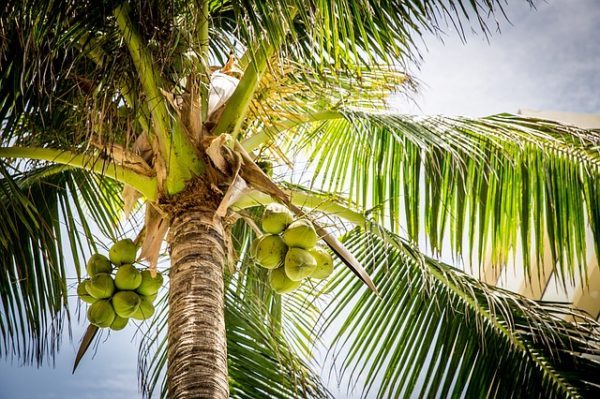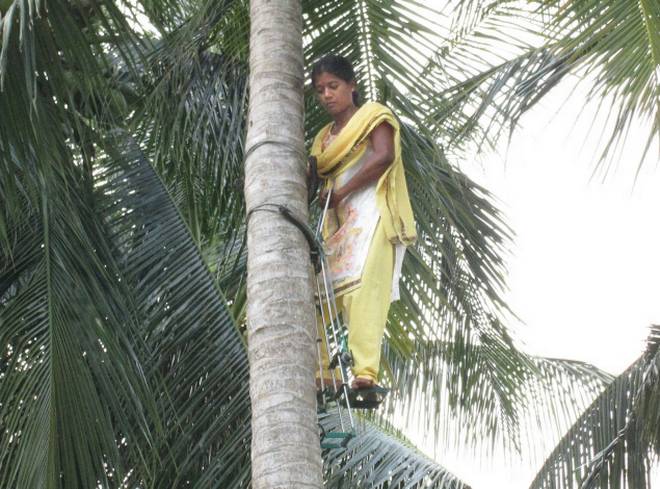In recent months, the coconut tree and coconuts have been put to the test. In 2015, the government denounced the status of the coconut tree from a tree to ‘grass’. A couple of years later, the availability of coconuts started diminishing at an alarming rate. This was due to the fact that there were no more padekars or paddelis (coconut pluckers) to remove the fruit from the trees. Then, whatever coconuts were available, were being sold at higher prices than normal, leading to people not being able to afford them.
Newspapers also reported that coconuts would be imported from Sri Lanka. Everyone that’s born and brought up in Goa, knows that the taste of Goan coconuts is definitely not the same as those from Sri Lanka. Now, in an attempt to solve the problem, the Agriculture Technology Management Agency in association with the District Rural Development Agency, South, will train two women from every village panchayat of South Goa district as paddelis (female coconut-pluckers) by next year.

The situation today
It’s no secret that the price of coconuts in the market is still high. This is because there an acute shortage of padekars and paddelis available to do the plucking.
According to a report in the Navhind Times, the government has also faced a lot of flak for not hiring locals as coconut pluckers, instead choosing to import the fruit from abroad. It also doesn’t help that the existing padekars already trained by the Goa State Horticulture Corporation Ltd are also unavailable for the job. The shortage of paddelis was discussed at a recent meeting chaired by the district collector.
“We, the District Rural Development Agency, South and the ATMA have planned to train two women from every panchayat of South Goa as paddelis by April 2019. Panchayats will be taken into confidence in this regards,” project director of ATMA, South, Shaba V Verenkar said. The ATMA works under the Department of Agriculture.
The selection process for paddelis in the state
The DRDAS has agreed to provide the ATMA a list of women willing to take up coconut-plucking. Additionally, the ATMA and the DRDA will provide all sorts of support to them including a 75 percent subsidy on buying the equipment.
Interestingly enough, a total of 17 women have already undergone training at an eight-day programme which was held in Canacona. Out of these, four were really courageous and climbing up the coconut trees with the help of equipment.
In turn, these four women will now train those that are interested, from the rural areas of Sanguem and Quepem talukas, according to Verenkar. The 17 women were trained by a woman from Jharkhand who is skilled at coconut plucking.
To drive the process, further along, a joint meeting of the DRDA, the ZAO, the ATMA and panchayat members will be held on March 5 at Canacona to deliberate on how to impart training for the women in that taluka.
Paddelis, the future of coconut plucking?
“A coconut tree is a unique tree. If coconuts are not harvested regularly then the trees see a decline in yield. A regular harvest not only helps the tree to grow well but also generates income to landowners,” Verenkar said, adding that if the shortage of paddelis continues then the state will face a ‘coconut crisis’.
“Hence we have come together to tide over the situation, deciding to train Goan women in coconut-plucking,” the project director said.
“Once the Canacona taluka is covered then the focus will shift to Quepem and Ponda talukas,” Verenkar said.
The four newly trained paddelis seem to be quite enthusiastic about their new jobs. Speaking to the newspapers, one of them, Yogita Sudhir said, “I am delighted about it. It’s a very easy job. The machine is good and there is no fear of falling down from a palm tree. I picked it up in just five days.”
But Verenkar has fewer expectations from the women of Salcete taluka, where women are educated and would shy away from taking up coconut-plucking.
“There has been an overwhelming response from the women of other talukas. I fear that there would be no takers in Salcete. However, we will try to convince the women there about the need. Training programmes will be held in Salcete after the monsoon,’’ Verenkar added.
Information credit – The Navhind Times
ItsGoa/FEB/KDGP


